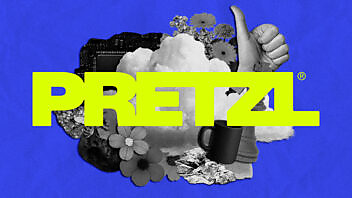Zippy the Insight Dog: a model of the new-style B2B planner
I don’t know about you, but I’ve had more fun in the last three years as a B2B marketer than I did in my first twenty. And I loved my first twenty.
When I started out (Madison Avenue, 1985), B2B was all about running print ads, making brochures, issuing press releases and designing multi-part direct mail pieces. Really.
It’s 2016 and I’ve found myself on a roller-coaster ride called Velocity (a B2B content marketing agency specializing in tech companies). Every day, all day, we’re busier than Grand Central Station is at 8am on Tuesday – but we’ve probably produced maybe three brochures in the last eight years. We do the occasional print ad campaign, issue zero press releases (does anyone still read them?) and – though I love me some hard-sell direct mail – almost never post anything to anyone.
My point? Change. Changechangechangechangechangechangechangechange.
Then, just as we get used to it… more change.
Today, I look around the office and – ignoring the pissing dog – see all sorts of weird people in roles that didn’t exist when I was a Mad Man. ‘Front-end’ developers (developers, apparently, have front or back ends but rarely have both); UX specialists; digital project managers; web analytics geeks; SEO hucksters (sorry: experts); marketing automation jockeys; content operations wonks…
Even the job titles that sound the same as the old ones are really different jobs altogether. A copywriter used to be like Darren from Bewitched (“Nothing dips like Crispy Chips!”). A designer used to do marker comps and send out for type. An account manager used to spend 30% of his or her time writing ‘meeting reports’.
And one role, the Planner, has managed to do two things at once: change beyond all recognition and stay essentially the same.
What hasn’t changed
Today’s B2B Planner – or Content Strategist or whatever title we’re giving them these days – is, at heart, the same species as the planners I worked with back in the day.
They’re still the advocate of the customer or prospect. They still study the target audiences to distill little granules (and occasionally large globs) of insight that can drive great creative and content.
They still have to be smart, smart, smart. And communicate clearly and compellingly, getting people excited about their ideas.
Planners are still insatiably curious and almost pathologically empathetic. They need to know how people and markets tick.
And they still drive Powerpoint like Hans Solo drives the… whatever the hell they call that zippy space-wasp-thing. (Actually, planners used to present using acetates. And hot, noisy overhead projectors. Yes: ha-ha, I’m old, get over it.).
But wrapped around this familiar role is a new set of skills (okay, a new ‘skillset’) that’s evolved in response to the new world of digital, multichannel, data-drenched content marketing.
Four new B2B Planner skills
Here are what I consider to be the four main skills that the new B2B planner or content strategist should be building today:
Content Chops
Today’s B2B planners need to understand content marketing and the role of content in the marketing mix. That means understanding not just the broader needs of the target audience but their specific information needs as well.
It also means being able to identify each client’s ‘sweet spot’: the zone where the client’s expertise and authority overlap with the things the target audience cares most about.
These days, a planner learning about a client’s business has to listen hard for the issues, themes and stories that make for great content. To identify the topics that are most relevant and timely – then give those topics a fresh spin.
Data DNA
Planners have always hoovered up insight from wherever they could find it. Today, a lot of the best insight is hiding inside data: in web analytics reports, marketing automation flows and CRM systems.
The best planners and content strategists today are those who lean in when they see a juicy dashboard. They know that all this data is a granular record of customer behaviour and intent. For insight hunter-gatherers, it’s gold dust.
Yesterday’s planners had to know their way around a market research report – the qualitative harvest of focus groups and interviews or the mediated data of commissioned surveys. Today’s must go directly to the digital snail-trails we all leave behind as we click and swipe through our online lives.
Planners are ethnographers at heart. They like to watch. And data analysis is virtual ethnography.
Digital desk research
Clients themselves are a primary source of input for any planning or strategy process. But only lazy planners stop there, taking the client perspective at face value. Yes, clients are experts in their fields – often the very top experts. But they’re also biased.
That’s why good planners have always spent a lot of time with real customers and prospects. They’ve also always done their desk research: reading analyst reports, journals, surveys and studies.
Today, this desk research is largely online. So today’s planners have a black-belt in Google and a backstage pass to Twitter, Facebook and LinkedIn. They can spin up (or at least request) a Moz or Sprinklr report, do some basic keyword analysis and sniff out an influencer at ninety paces.
Omnichannel omniscience
In the good old days, a planner had to think about how their insights could be deployed in a few, broadcast-style media.
Today, planners need to understand a far richer palette of possibility. From mobile apps and social stunts to interactive content, dynamic creative, personalized pages, micro-targeted emails and content-powered nurture flows.
They could leave this to their colleagues in creative, media and marketing operations – but they’d be the worse for it. Because if planners keep in mind all the available channels, they will listen differently and create more actionable briefs.
B2B planners and strategists: this is your moment
In many, fundamental ways, marketing hasn’t changed, so the planning role in a B2B agency hasn’t changed.
Intelligence, curiosity, empathy, the ability to make those magical little leaps of insight and the power to communicate them to others are still the core skills.
But in many other ways, B2B planning is a whole new discipline. A discipline re-shaped for the new world of digital, data-driven, content-centric many-channelled B2B. A planner from Sterling Cooper, the scotch-soaked agency from Mad Men, might eventually find his or her (let’s face it: his) feet in a place like Velocity, but it would take some fast learning (up-skillsetting?).
Hey you talented B2B planners: any new skills I’ve left out?
Join the conversation. (Even better, join… Velocity.)

Enjoyed this article?
Take part in the discussion








Comments
Nandini ProdPad April 16th, 2016
Agree, agree, agree! Can you produce content without knowing how their audience talks, thinks and feels? You can. But it’s not going to be particularly inspiring.
This will help you with every other part of your job – keyword research, content ideas, channel strategy, and so on.
The winners in any B2B content battle will always be the ones who can internalize the language their audience uses, the problems their audience trying to solve, and frame a solution in terms that resonate with them.
In other words, talent will only get you so far. Talk to your customers as much as possible!
Doug Kessler April 17th, 2016
Amen.
I like that phrase, “internalize the language your audience uses’. (I’m a gonna steal that…)
Jon Butt April 18th, 2016
I’ve always loved the way you write, Doug.
This is a fabulous explanation of how advertising has evolved and morphed into its current guise.
And, no doubt, it will continue to evolve and leave behind the complacent while the rest of us concentrate on providing quality information to our customers, when and where they want it.
Keep up the good work 🙂
Doug Kessler April 19th, 2016
Thanks Jon! Appreciate the kind words.
MD May 18th, 2016
Without any strict planners, our copywriters do the planning themselves. They are tasked with calling our client’s clients and running through quick little interviews. They then use that precise language to speak to prospects. Works wonders.
Doug Kessler July 5th, 2016
We do that too. Writers are natural planners (and they can then get the story on paper too!).
richard lomax beetroot May 19th, 2016
superbly crafted copy as always. one of the very few, actually the only, one of these emailers I ever open and look forward to reading.